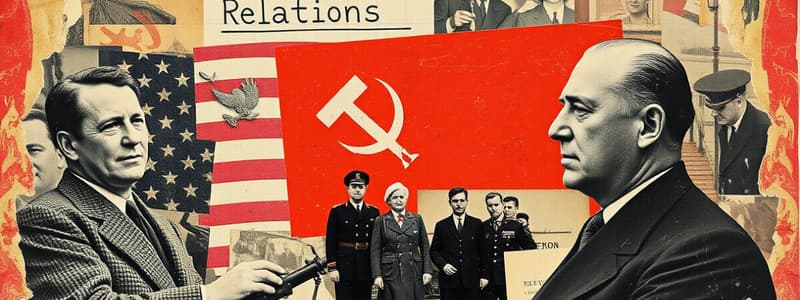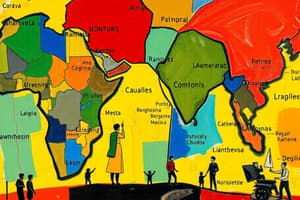Podcast
Questions and Answers
What is the Cold War?
What is the Cold War?
- A cultural exchange program
- A peaceful negotiation between two countries
- A military alliance
- An era of high tension and rivalry between the United States and the Soviet Union (correct)
What does the term 'Iron Curtain' refer to?
What does the term 'Iron Curtain' refer to?
The division in Europe caused by communism.
What is containment?
What is containment?
A policy that called for resisting the spread of Soviet power and influence.
Who was George F. Kennan?
Who was George F. Kennan?
What was the Truman Doctrine?
What was the Truman Doctrine?
What was the Marshall Plan?
What was the Marshall Plan?
What was the Berlin Airlift?
What was the Berlin Airlift?
What does NATO stand for?
What does NATO stand for?
When did the Berlin Airlift take place?
When did the Berlin Airlift take place?
What were the components of George F. Kennan's containment policy?
What were the components of George F. Kennan's containment policy?
What was life like in America after World War II?
What was life like in America after World War II?
Who was Chiang Kai-shek?
Who was Chiang Kai-shek?
Who was Mao Zedong?
Who was Mao Zedong?
What is McCarthyism?
What is McCarthyism?
What happened in politics in post-war America?
What happened in politics in post-war America?
How did the U.S. respond to Soviet actions in Europe?
How did the U.S. respond to Soviet actions in Europe?
Flashcards are hidden until you start studying
Study Notes
Cold War Overview
- Cold War marked a period of high tension and rivalry primarily between the United States and the Soviet Union.
- The term "Iron Curtain," coined by Winston Churchill, described the ideological and political division in Europe due to communism.
Key Policies and Strategies
- Containment was a key policy aimed at resisting the spread of Soviet power and influence globally.
- George F. Kennan was an American diplomat and specialist who advocated for the containment policy to limit Soviet expansion.
- The Truman Doctrine involved U.S. support to free nations to counter the spread of communism, particularly in Greece and Turkey.
- The Marshall Plan was a significant economic aid initiative designed to help rebuild Western Europe post-World War II, fostering democratic governance.
Major Events and Reactions
- The Berlin Airlift (June 1948 - May 1949) involved British and American aircraft delivering supplies to West Berlin in response to a Soviet blockade.
- NATO (North Atlantic Treaty Organization) was established as a military alliance among 12 nations for mutual defense against possible Soviet aggression.
- Tensions escalated after Churchill's Iron Curtain speech, which prompted the Soviet Union to bolster military resources.
Political Environment
- The roots of the Cold War traced back to U.S. suspicions of Soviet intentions during the 1920s and 1930s.
- Developments during World War II exacerbated tensions, with Stalin feeling abandoned by the Allies.
- Post-war America experienced a surge in consumer demand, a baby boom, and heightened labor unrest.
Domestic Politics
- President Truman faced criticism; the 1946 elections saw Republicans gain a majority in Congress, while Truman won the 1948 presidential election despite opposition to his Fair Deal programs.
- The formation of the United Nations, World Bank, IMF, and GATT aimed to build a cooperative international framework after the war.
Anti-Communism Sentiment
- Chiang Kai-shek led Chinese Nationalists; Mao Zedong was the leader of the Chinese Communists.
- The House Un-American Activities Committee (HUAC) was established to investigate suspected communist activities in the U.S.
- The Hollywood Ten were a group of filmmakers jailed for refusing to cooperate with HUAC's investigations.
- Alger Hiss, a government official, was accused of being involved in communist espionage within the U.S. government.
- Senator Joseph McCarthy became infamous for his aggressive campaigns against alleged communists, a period known as McCarthyism, characterized by fear-driven tactics and unfounded accusations.
Overall Context
- The post-World War II landscape was one of urgency to prevent further communist expansion, shaping U.S. foreign and domestic policies significantly throughout the Cold War era.
Studying That Suits You
Use AI to generate personalized quizzes and flashcards to suit your learning preferences.




